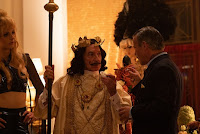Salvador Dali was a self-described “anarchist, monarchist Catholic.” That is three strikes against him in today’s groupthinking world, but Mary Harron made a film about him anyway. He was, after all, the most recognizable artist of his time, or any other. Dali knew it too. His fame combined with his eccentricity and constant financial shortfalls makes him decidedly difficult to work with in Harron’s Daliland, which opens Friday in New York.
At this late stage of Dali’s career, he can practically sell anything with his signature on it, which is fortunate, because he and his wife Gala spend money like water. Frankly, he and his manager, Captain Moore, might even be complicit in flooding the market with dubious prints and lithographs. However, fresh-faced (and fictional) James Linton has yet to be so disillusioned by the art world (but it will come). Initially, he is thrilled when his gallerist boss “lends” him to Dali to assist the preparations for his upcoming show, which still includes painting eighty percent of it, or so.
Initially, Gala Dali was also hoping Linton would “assist” her too, but he wriggles out of those duties when she starts obsessively focusing on her latest “project,” Jeff Fenholt, the Broadway star of Jesus Christ Superstar, who would eventually become a musical televangelist. Ironically, Dali’s bemused pal Alice Cooper, who eventually starred in the live TV production of Superstar, also appears as a minor supporting character, reacting with a healthy degree of skepticism to the artist’s more over-the-top provocations. Of course, Linton thinks it is all quite charming, especially Ginesta, Dali’s waifish model-entourage member, until things really get to be too much.
In addition to the three strikes from Dali’s politics, Daliland carries a fourth strike thanks to Ezra Miller, who appears in flashbacks as the young Dali. Yet, ironically, the “troubled” thesp is arguably more convincing and compelling as the younger Dali, especially when recreating the artist’s fits of spasms and bouts of neuroses.
Admittedly, Sir Ben Kingsley is highly entertaining to watch chewing the scenery as the older incarnation of the artist-provocateur, but his performance is more about embracing and accentuating Dali’s eccentricities than exploring his inner psyche. Arguably, Miller is more successful at the latter, with far less screen-time.
It is also a rather pleasant surprise how much Christopher Briney brings to the film as Linton, because his character’s main reason for being is to gawk at the Dali’s unconventional excesses. Yet, he really helps humanize the film. There is no question the final sequence would not payoff to the extent that it does, if he were not so solid anchoring the film. Likewise, Rupert Graves is drily effective and roguishly charming as the dodgy Captain. For much of the film, Barbara Sukowa’s Gala is a real pill, but she eventually reveals the woman’s profound sadness.
All the bacchanal revelries guarantee Daliland is never boring, but it rarely ventures below surface depth. The producers’ apparent inability to secure the rights to show Dali’s most iconic works is also a conspicuous drawback Harron never fully manages to work around. The film is flamboyant and eager to scandalize, but it more like a box of sugary candies than a meaty meal you can sink your teeth into. After watching the film, most viewers will feel like Dali is an even more distant figure than before. Recommended only for those in the mood for some gossipy spectacle, Daliland opens this Friday (6/9) in New York, at the Quad.

